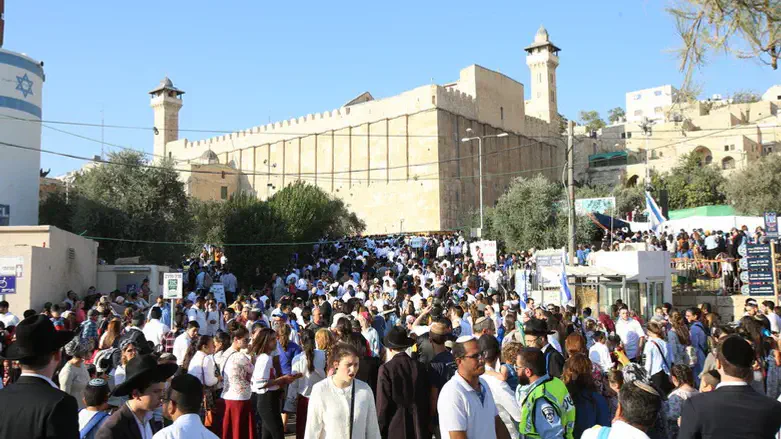
It has become a moving and unifying tradition in Israel to read the Torah portion of Chayei Sara, which includes the story of Abraham purchasing the Cave of the Patriarchs from Efron the Hittite, in the Cave of the Patriarchs itself. The annual tradition attracts thousands of Jews from all over the country to the city of Hebron.
Masses of people have already begun to flow into the city of Hebron and Kiryat Arba. The residents of Hebron and Kiryat Arba allow sometimes as many as a dozen guests into each home in a special display of hospitality. A community action group calling itself 'Revivers of the Jewish Settlement in Hebron' has undertaken the challenge of registration and reception. Local schools have been converted into makeshift dormitories and the classrooms into communal sleeping quarters. There are also significant logistical challenges on the roads around the city due to the increased traffic both before and after Shabbat.
During Shabbat, a rich and varied cultural and educational program is held. Prominent public figures, including ministers and MKs, come to give lectures and lessons to the general public, alongside local Rabbis and scholars. The topics cover a wide range of subjects related to Jewish heritage and Hebron, its history, and its contemporary significance.
Concurrently, guided tours of the historic sites of Hebron are offered, allowing guests to connect to the ancient story of the city. The itinerary also includes a visit to the new homes purchased by the 'Harechivi' movement, which is expanding the Jewish settlement in the city. These tours provide a unique opportunity to get acquainted with the city's rich history alongside the contemporary development of the Jewish community in it.
During Shabbat, all parts of the Cave of the Patriarchs are reserved for Jewish worship only, as opposed to the normal division of the cave between Arab and Jewish services.
This year, due to the special security situation, the Shabbat will be held in a more limited format. Despite the challenges, thousands are expected to attend the special Shabbat. The Chabad of Hebron, the Kiryat Arba-Hebron Religious Council, and the Hebron Guest House have been working hard to accommodate the guests and have promised that no one will go hungry. Although the traditional giant tents will not be erected in the plaza of the Cave of the Patriarchs this year, the Chabad House in Hebron has mobilized to find creative solutions to feed the many guests.
Uri Kraus, director of 'Revivers of the Jewish Settlement in Hebron', says: "The Shabbat in Hebron is much more than a religious or historical event. It has become a tangible expression of the deep bond between the Jewish people and its heritage, and it demonstrates the power of mutual responsibility and unity. This year, more than ever, Shabbat Chayei Sarah in Hebron symbolizes the resilience of the Jewish people. It demonstrates how even in challenging times, the deep connection to heritage and the mutual responsibility continue and even strengthen the connection between the past, present and future of the Jewish people in this sacred place takes on special meaning in these days."
